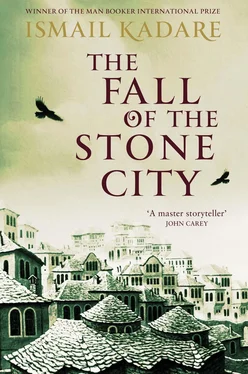As evening fell, another man was listening carefully to the tumult from the upper floor. The unhinged Remzi Kadare, the former owner of the house, huddled in army blankets, added his own expletives to the bedlam above. “You tart! You whore!” he shouted, addressing the house that had been his own home before he lost it at poker. “That’s what the place deserves,” he roared. “Drip blood and gall! I knew you weren’t to be trusted. I was right to take a chance with you! I risked you and lost you, you bitch!”
The night gradually grew colder and he wrapped himself more tightly in the blankets. Burying his head in them, he sang to himself.
I saw a nightmare, mother, the worst of all my dreams
Our big house was a hospital, full of groans and screams.
I woke from sleep, dear mother, and wept at dawn of day
I thought I’ll burn it down, or gamble it away.
And so I did, dear mother, and I’m a wretched knave
My wife has gone to Janina, and you are in your grave.
Remzi was my first name, my surname Kadare
You should have fed me poison when at your breast I lay.
The weeks passed quickly. Winter held the city under its stern rule. But this meant little to the mind of Vehip Qorri. “Blind Vehip” had been a rhymester since the previous century, before there were newspapers. As his nickname indicated, he had been blind since birth but even though he had never seen the world, he described it accurately in verses that were full of dates and the names of people and streets. He composed some of his rhymes to order and for a small fee, to mark occasions of every kind such as birthdays or the award of decorations, to advertise barber shops, or announce changes of address and opening hours. He produced others to publicise court verdicts, quarrels, scandals, municipal notices, riding accidents, the imposition of fines, cases of intoxication, the downfall of governments, currency devaluations and the like. People who enjoyed rhymes would stop at the street corner where he had his pitch, ask for verses about X or Y and pay him or not, according to how they liked the result.
Sometimes his customers, for one reason or another (when faced with threats for instance, or when an engagement that the rhyme celebrated was broken off) asked him to remove a verse from his repertoire, again for a fee. This would cost more than the original composition.
That was Blind Vehip’s daily routine. Occasionally, but very rarely, he would take it into his head to compose a rhyme without a commission, “from the heart”, as he put it. His usual rhymes were topical but his verses “from the heart” were obscure and elusive.
At the end of April he produced a verse about Big Dr Gurameto, perhaps his grimmest yet.
Gurameto, the mortal sinner
Met the devil one day on the street,
Who told him to host a great dinner
With champagne and good things to eat.
His listeners did not say what they thought of this verse. At first they merely frowned, turned their backs and walked slowly away. Gurameto no doubt understood the rhyme completely but he was totally aloof to anything that happened on the street and took no notice. Then the audience began to grow steadily at Blind Vehip’s usual spot at the crossroads of Varosh Street and the road to the lycée. Dr Gurameto passed here regularly on his way to the hospital but never turned his head.
Two weeks later, Blind Vehip, perhaps smarting at the snub or maybe simply on a whim, produced a new version of his rhyme. Now the words made your flesh creep.
What was the doctor’s design,
Asking the corse to dine?
The archaic word “corse” that old people still used to refer to the dead made it seem more frightening; perhaps this was what led Big Dr Gurameto to swallow his pride and, early one evening, stop in front of old Vehip. He waved a couple of idlers away with his hand. “What have you got against me?” he said.
The blind man recognised his voice and shrugged his shoulders. “Nothing. What could I ever have against you? Just look at yourself, compared to me.”
“You’re lying. You’ve got it in for me. But you won’t tell me why.”
The blind man paused for a moment, and then said curtly, “No.”
Dr Gurameto was famously reticent but his silence was still striking.
“That dinner seems so long ago,” he eventually said in a low voice. “I can barely remember it myself. Why bring it up now?”
“I don’t know.”
Gurameto turned his head to make sure no one was listening. “Do you really believe that I invited the dead to dinner that night?”
“I don’t know what to say,” the blind man replied.
Gurameto stared at him fixedly. “Vehip,” he said. “I want to ask you something, as a doctor. Do you remember when you lost your sight?”
“No,” the blind man said. “I was born like this.”
“I see. So you’ve never seen living people.”
“Neither the living, nor the dead,” said Vehip.
“I see,” repeated Dr Gurameto.
“That comes as a surprise to you, I can tell,” the blind man said. “You’re surprised that I’ve never seen the living, but still more surprised I’ve never seen the dead.”
“That’s true,” said Gurameto. “Blindness is close to death. I won’t interfere with you. I’m not threatening you and I won’t promise anything. Make whatever rhymes you like.”
As he walked away, he heard the blind man’s voice behind him. “Long live the doctor!”
The German Army retreated from Greece and Albania at the same time. It looked like a routine redeployment of troops. An unending column of vehicles rumbled all night along the asphalted highway. Daybreak came feebly, ash-grey. A fine rain turned to sleet, making the windows of the houses opaque. It seemed only natural for the city to show no interest in this great historical event.
The regiment housed in the Grihot barracks joined the long convoy and the troops from inside the city itself followed them. There were neither farewells nor appeals to the people to cover the withdrawal with rearguard attacks against the encroaching forces of communism. The old threats to blow up the city now seemed stale and empty.
The Germans lowered the swastika flag and left the national flag with the lonely eagle in the centre. With no sign of pride or shame and no reaction to the city’s indifference, the Germans climbed into their vehicles and set off to find new terrain.
A NEW ORDER
Just before noon the communist partisans entered the city from not one but three different directions. They stared at the great houses of Gjirokastër with awe and smiled hesitantly, uncertain where to put the welcoming flowers the citizens threw at them.
The mules could barely climb the steep lanes and looked wearier than the fighters themselves. Most were laden with mortar barrels and crates of ammunition, yet the partisans led them by the halter as if they were carrying grain or cheeses wrapped in cloth.
The young women among them attracted particular attention. They wore their hair in all kinds of styles, plaited, cropped, with long tresses or fashionable fringes. There had been contradictory rumours about them: either they were “Red virgins” who would kill at the slightest affront or they were wild about men.
The scene looked so peaceful, yet the city’s fears of what the partisans might do turned out to be well-founded. The first knocks at the gates of houses were followed by the wails of women and screams. “He’s innocent.” “Traitor! Get away, bitches.” “No!” And then the stutter of gunfire. “Territorials”, as the local communists were called, helped the patrols to carry out arrests of prominent nationalists.
Читать дальше












